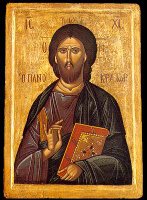Icons and the Emerging Church

 Andrew Jones (a.k.a. Tall Skinny Kiwi) has an interesting post today on icons and the emerging church. For those of you outside the orbit of emergent church stuff, Andrew Jones is a protagonist in the movement. He is more involved on the other side of the big pond with Dawn Ministries in Europe. I actually don't know too much more than what I gather reading his blog occasionally.
Andrew Jones (a.k.a. Tall Skinny Kiwi) has an interesting post today on icons and the emerging church. For those of you outside the orbit of emergent church stuff, Andrew Jones is a protagonist in the movement. He is more involved on the other side of the big pond with Dawn Ministries in Europe. I actually don't know too much more than what I gather reading his blog occasionally.I was asked the other day why I blog. Musing on that question, I think of several reasons that led to the genesis of keeping a blog. I will list a few below. Some of the items listed below represent not just why I blog, but the landscape (convergence of technology and cultural impulses) that have led to a proliferation of blogging.
1. The world is flat. The information age, the internet, and the democratization of communication capability has eliminated the middle man. Now everyone can access almost any information. And almost anyone can publish information. The deluge of digital text and images is allowing for new ways for people to create, express themselves, network, interact as social beings...thinkers...humans...in cyberspace. This phenomenon represents the democratization of communication and voice. Everyone who has a computer and access to the internet can access this information highway and contribute their unique and particular voice to the Glocal community. There are not gatekeepers denying anyone with these simple tools access. This is very democratic.
2. I began blogging soon after having read Generation to Generation, by Friedman. I was thinking about family theory and congregational systems. I was thinking about pastoral theology. One of the things Friedman suggests is healthy for leaders to do is to self-differentiate--to be open about perspectives, identity and vision they hold. This frees the congregation to not be held captive by fear and anxiety by uncertainty as to where the leader is at, or even worse to be locked in some kind of hidden, manipulative power game. Ahhh, church politics. Why would Friedman think that kind of stuff ever happens in churches?!!!? (:) So my blog is a way I attempt to be real about my own journey. It is a public space where I make room for conversation, for working out my own theology and salvation (in fear and trembling). It sometimes feels like a risk, but I would rather be real than play some kind of role just to keep the system going.
3. Blogging represents the postmodern impulse for Truth to be narrative. The postmodern sensibility is skeptical of propositional truth. Every medium and discipline of our time in some way reflects an awareness or adaptation to this sensibility--Reality TV, Action Research, Narrative theology, and on and on... So blogging is a way of expressing self, and the narrative the self emerges from. As I blog, I am expressing some of what the world looks like from inside my skin. Truth intersects with my experience, and my voice is heard. The Gospel is centered on this same dynamic--the Word became flesh and dwelt among us. The power of the Gospel is that it is not esoteric, it is messy and particular. It is a manger, a birth canal, bread and loves, nails and a cross, bread and wine. The Gospel is iconed in the material world. So icons are not limiting, nor idolatry, but they point to the fact that the Word becomes flesh. Incarnation. History.
4. I believe blogging is an expression of our longing for community. We are created as communal beings. The social medium may look different, but it is the same impulse for community that gives rise to it. To know and be known, that has always been a part of the human story. Blogging is just another layer of communication. It does not replace face to face interaction, it just adds another layer that can enhance and broaden our interconnectedness. Time and space are eliminated as barriers to our communication. Again, the world is flat.


1 Comments:
At 3:51 PM , Anonymous said...
Anonymous said...
viagra covered by insurance too much viagra can viagra be used by women online viagra buy cheap viagra online viagra patent viagra without a prescription viagra facts bad side effects of viagra how long does viagra last viagra england splitting viagra women's viagra viagra prices
Post a Comment
Subscribe to Post Comments [Atom]
<< Home